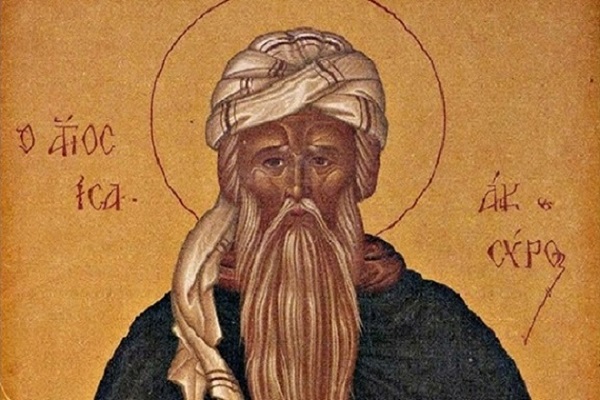Saint Isaac the Syrian (†28 September): His words dispel complexes
6 October 2016Saint Isaac the Syrian (†28 September)
Saint Isaac was born at the beginning of the 7th century at Beth Quatraye in the Qatar region at the southern end of the Persian Gulf. When he was still young, together with his brother, he entered the Monastery of Saint Matthew and, after progressing greatly in the virtues, in obedience and in knowledge of the Holy Scriptures, he withdrew into the desert. His brother became the abbot of the monastery and continually pressed him to return, in order to benefit the brotherhood spiritually. His fame spread as far as Nineveh, where the faithful managed to persuade Catholicos George to consecrate him bishop (in about 648). Isaac submitted to the will of God and began to guide his flock with great wisdom. Not five months had passed when two members of the congregation, who had asked him to resolve a difference between them over the matter of an outstanding loan, rejected his advice and said: ‘Leave the teachings of the Gospel aside for the moment’. This was enough for him to return to the desert, because, as he said: ‘If the Gospel can’t be present here, what did I come to do?’ He resigned and withdrew to Mount Matout, in today’s Kurdistan, where many ascetics lived, and then retired to the Monastery of Shabar (in today’s Northern Kurdistan). Here he studied the Scriptures with such diligence that his eyesight was adversely affected. He ate no more than three loaves of bread a week and some fresh vegetables, abstaining completely from cooked food.

From his love of the brotherhood and for their spiritual benefit, he expressed divine teachings, which his disciples recorded. In his discourses, he describes all the states of the soul which is making its way towards redemption and union with God.
According to Saint Isaak, faith is the first stage of liberation from subjection to the world and the passions. Through faith, people wake up and begin to take virtuous actions (fasting, sobriety, study of the Scriptures, vigilance and prayer). Then they can find the entrance to heaven within their hearts. Through the hesychast life and silence, ‘the mystery of the life to come’, people will experience the most wonderful states, which it is impossible for the human mind to conceive. Through the purification of the heart they can progress in humility, the ‘garment of divinity’, because this is what the Word of God donned in order to become a human person. Humility embraces all the other virtues and gives us the purity which allows us to see all other people as good and innocent.
As humility progresses, we’re cleansed and our intellect’s illumined and, with the experience of various degrees of prayer, is led towards pure prayer. In this state, the intellect tastes the Grace of God. It sees God, it’s united with Him and enters His kingdom. People who are purified and peaceful will become a living image of the love of God for others and of His great affection for us. Abba Isaac’s work is a required guidebook for all Orthodox souls, if they wish make their way towards God in safety. This is why a contemporary elder, Fr. Ieronymos on Aegina advised us even to go as far as begging in order to acquire the works of Abba Isaac. He also told his spiritual children: ‘Don’t let a day go by without reading at least a page of Abba Isaac. I really love the man and have his as my Elder. And whatever you read, take it to heart and say to yourself: “Do I do this?” In this way, you’ll be moved to progress from reading to action’.
For a long time, Saint Isaac didn’t have a day in the calendar when he was commemorated. He was usually commemorated on 28 January, the same day as Efraim, the other great Syrian Father of the Church. Some years ago, though, on the initiative of Saint Païsios the Athonite, who greatly venerated Saint Isaac, a service was composed for him and 28 September was chosen as the day for celebrating his blessed memory. Indeed, the first church on the Holy Mountain to be dedicated to Saint Isaac has been built at the kelli of a monk who was close to Saint Païsios.
In his book Ἐπιστολές (Letters) Saint Païsios writes: ‘Abba Isaac will help you greatly because he makes people understand the deeper meaning of life and if people believe in God, he helps them to dispel any complex, great or small, that they may have. Studying Abba Isaac even just a little alters the soul through the vitamins it provides’. Writing about Papa-Tikhon in his book Αγιορείται Πατέρες και αγιορείτικα (Athonite Fathers and Athonite Matters), Saint Païsios says: ‘One day he asked me what books I read and I answered “Abba Isaac”. “Goodness gracious me, there’s a great saint. Abba Isaac wouldn’t hurt a fly”. He said this in order to point out the great spiritual sensitivity of the Saint’.






